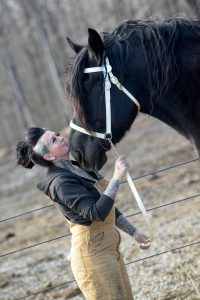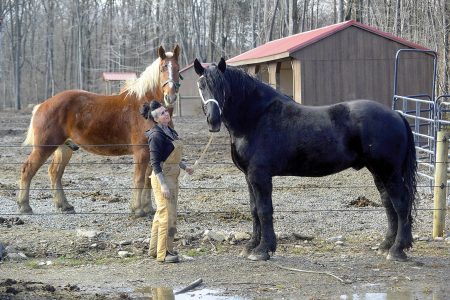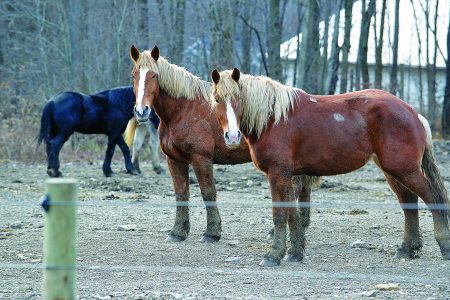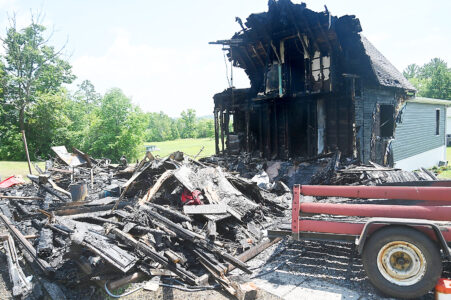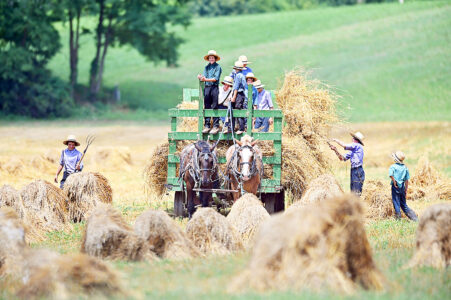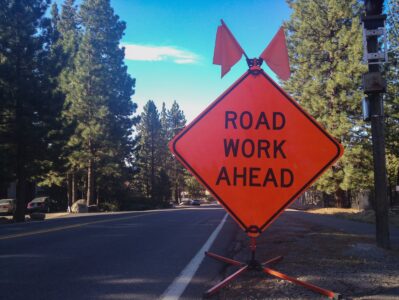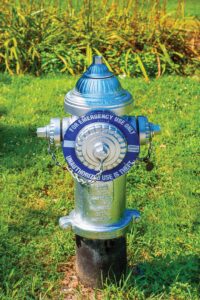A ‘cut’ above: Rescuing draft horses passion for Dysart woman
- Lexy Mathe tends to “Layne,” her favorite Percheron, who once was homeless and emaciated, but now weighs more than 3,000 pounds. Mirror photo by Patrick Waksmunski
- Lexy Mathe stands with Percheron “Layne” (right) and Belgian “Playboy” at Devil’s Cut Draft Rescue in Dysart. Mirror photo by Patrick Waksmunski
- A pair of Belgians are pictured at Devil’s Cut Draft Rescue in Dysart. Mirror photo by Patrick Waksmunski

Lexy Mathe tends to "Layne," her favorite Percheron, who once was homeless and emaciated, but now weighs more than 3,000 pounds. Mirror photo by Patrick Waksmunski
DYSART — On a recent afternoon, Lexy Mathe walked out her front door wearing shorts and tall rubber boots and strode across a muddy pasture hardened by the cold.
Off in the distance, a group of draft horses clustered around a hay feeder, jostling their large bodies against each other as snow swirled around them.
The horses — Zwan, Veruca Salt, Vermillion, Zeppelin, Maynard and Layne — stepped back to make way as Mathe ducked beneath the canopy created by their massive heads.
Each of the horses has a story to tell, but they let Mathe do the talking.
Layne, for example, is a stunning black gelding that was once a homeless emaciated stallion. Now he’s 3,000 pounds of muscle with chronic circulation problems in his right hind leg.
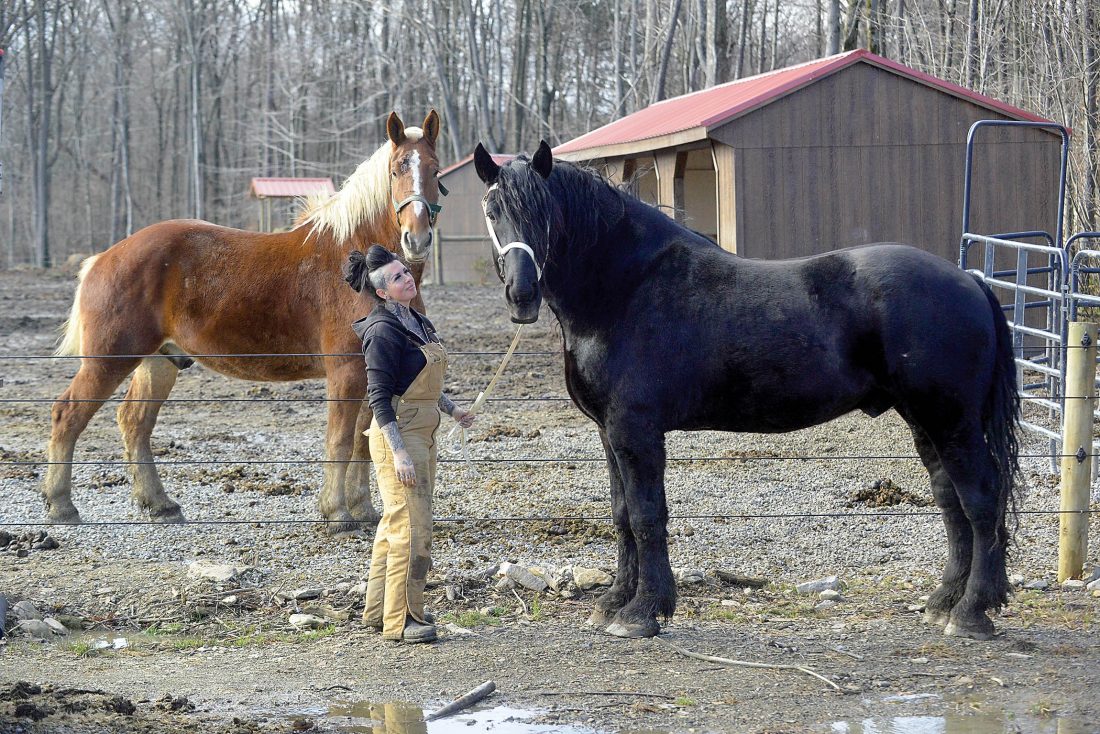
Lexy Mathe stands with Percheron “Layne” (right) and Belgian “Playboy” at Devil’s Cut Draft Rescue in Dysart. Mirror photo by Patrick Waksmunski
“He’s the ‘herd boss,'” Mathe said, running her hand down his long wavy mane. “Everyone else looks to him to know what to do.”
At 5-foot-7, Mathe is dwarfed by these “Big Guys and Girls” as she affectionately calls them. Named after rock bands and musicians, they are all rescued draft horses that Mathe cares for on her sanctuary farm in Dysart — Devil’s Cut Draft Rescue — named because the farm is located on top of the Buckhorn above the devil’s elbow.
Nonprofit rescue
Nine years ago, Mathe started the nonprofit rescue with the goal of saving and rehabilitating — and responsibly re-homing — former workhorses from the grim fate of a slaughterhouse.
Thousands of horses each year are shipped to Canada and Mexico for slaughter, and their meat is sold to France and Japan, where it’s considered a delicacy, according to the American Society for the Prevention of Cruelty to Animals.
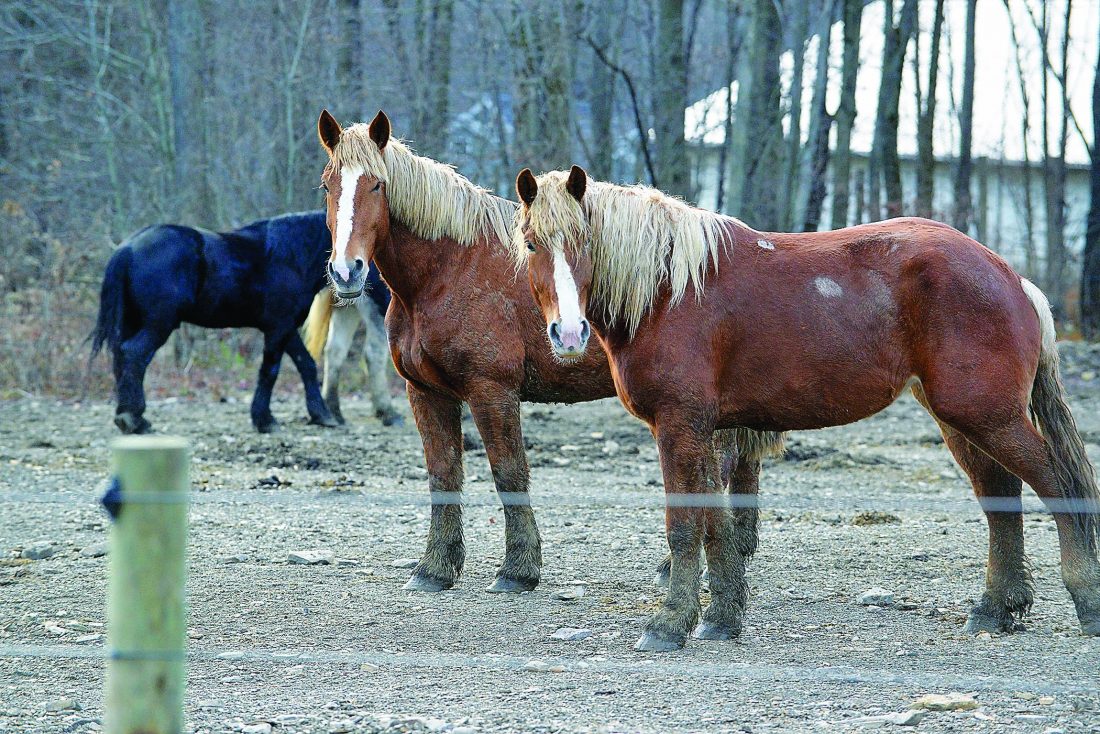
A pair of Belgians are pictured at Devil’s Cut Draft Rescue in Dysart. Mirror photo by Patrick Waksmunski
That can involve cramped trailer rides for days without food or water, or sitting in holding pens, sick without medical care, Mathe said.
Some are seriously injured or killed during transit, according to the ASPCA.
“Their path to slaughter is straight torture,” Mathe said. “Horses are sanctioned as livestock, so they don’t have many rights, and there’s no one to protect them.”
Currently, Mathe has 15 horses (and one donkey) and is focusing all of her rescue efforts on draft breeds — horses that are bred for their brute strength and ability to pull heavy loads, especially when plowing fields.
A majority of the farm’s residents are former Amish workhorses that are not able to continue working for a variety of reasons, from illness to age, she said.
“(The Amish) use them so much, so when they get sick or can’t work or it’s the end of the farming season, they take them to auction and buy new ones,” Mathe said.
Jumping to draft
Mathe, 33, grew up in Indiana, Pa., working with hunter-jumper horses from an early age. Her background with draft horses dates back to her grandparents, who logged and farmed using Belgians.
When Mathe retired her show-jumping horse in 2013, she found herself at a crossroads with equine work and decided to start rescuing drafts.
It’s an endeavor she has found most rewarding.
“That was the turning point for me,” she said. “What I soon discovered is that I was very sheltered to the reality of slaughter and draft horses. It’s a vicious cycle what these horses go through, and when I take a step back and see the bigger picture, I feel guilty that I didn’t see it earlier.”
It took a while to get used to the horses’ sheer size — her tallest draft measures in at 6-foot-7, and yes, Mathe does ride a few of them.
“I jump off the bed of the truck or get thrown up there,” she said about climbing atop the tall horses.
Mathe’s proximity to a high concentration of Amish farms in central Pennsylvania also means easy access to draft horse auctions — such as the ones at Centre Hall — and “kill pens” — the last stop for a horse before it’s shipped to slaughter.
Many of these horses are already experiencing medical problems — such as infections or neurological issues — or malnourishment. Some can be close to death and just need humane intervention to end their suffering, Mathe said.
Devil’s Cut will gladly bring them home.
Spiritual connection
“We try to give them pain management and keep them comfortable,” she said. “Unfortunately, a lot of these guys are too far gone,” she said.
Mathe said the Amish farmers have always been kind and helpful — and perhaps a little curious about the raven-haired female horse buyer with the body art.
“I’ve actually learned a lot from them,” she added. “Some are good, some are bad. There are a lot that are passionate about their horses. I don’t like the stigma they get.”
When Mathe attends a sale, she goes early and does a walk through, looking for specific characteristics or a horse that catches her attention.
Often she makes a personal connection with a horse that cannot be explained — it’s on a spiritual level.
“They are so sick and run down,” Mathe said. “You can look in their eyes and tell that their spirit is broken. When we make eye contact, I say ‘I am not leaving here without you.'”
Prices at horses at auctions are high these days, but Mathe pays anywhere from $1,000 to $2,500 for a horse, depending on its condition.
After the horses arrive home, they are examined by a veterinarian, updated on vaccines and put on a minimum 21-day quarantine. A few are selected to stay with Mathe and her family forever.
Others, like the 18-hand John Mule named Sampson, are rehomed after a long vetting process.
Eliza Scheidemantle, 24, adopted Sampson (formerly Diesel) after her rescued Belgian had to be put down last fall.
“I knew I wanted another rescue, but I wasn’t sure I was ready,” said Scheidemantle, who lives on a horse farm in Washington, Pa. “He totally melted my heart when I saw him. He is a sweet, gentle giant that has fixed my broken heart.”
Sampson spent his life plowing, resulting in fluid on his knees, which landed him in a kill pen and one step away from slaughter.
After Scheidemantle adopted him from Mathe and brought him to her farm, it didn’t take long before his personality began to emerge.
“He was cautious at the beginning; cautious around machinery and cautious about who we were,” Scheidemantle said. “Now he’s wonderful, and he’s in your pocket looking for a treat.”
Scheidemantle plans to adopt another horse from Mathe, and is looking at Zeppelin, a big Belgian mare. Her hope is that she can give the horses the life they deserve and the love they need.
Loyal draft horses
Drafts by their laid-back nature have so much more to offer humans than a meal, Mathe said. They are known to be highly intelligent, relatively calm and have a cooperative working relationship with humans.
“These are loyal animals that work very hard and they will do anything you ask,” Mathe said. “They work too hard to be put out like that.”
Mathe’s work as a full-time registered nurse helped support her passion for many years. Now, Devil’s Cut is recognized as a 501(c)(3) Organization for Animal Welfare, which allows Mathe to accept donations and raise funds on a grander scale.
Supporting the horses can be pricey, as many need specialized care. Mathe estimates that it costs anywhere from $5,000 to $6,000 a month to care for the herd, and that doesn’t include farrier or vet bills.
The horses consume 5,000 pounds of grain every month — each up to 18 pounds per day. She also gives them high quality hay and goes through 30 large round bales each month.
“Many sanctuary animals also have medical conditions that need lifelong treatment,” she added.
Zwan, a Percheron gelding, has two clubbed feet on his left side and needed months of consistent farrier work.
Maynard, another Percheron gelding, has to keep his hoof wrapped to keep a fungal infection at bay.
Iowa, from Centre Hall, required surgical removal of a cancerous mass from his left eye, leaving him partially blind.
“He’s very selective about his people,” Mathe said. “You can tell he was not treated very well. He’s not mean, just reserved.”
‘Raise bail’
She also leans on donors who follow her rescue on her Facebook page. Often, Mathe will ask her followers to “raise bail” for a specific horse she wants to save.
“People can connect with that animal they saved and they can feel that they were a part of it,” she explained.
Mathe keeps the page updated daily with auctions she plans on attending and pictures of current horses she hopes to “pull” from kill pens. Future plans include building a larger barn and hosting an open house this spring.
Leah Titerence, a dog trainer and rescue horse owner based in Lothian, Md., became fascinated by Mathe’s work after reading an online post featuring a draft horse with a swollen, infected leg.
“It was pitiful looking, and I felt so bad for it,” Titerence said. “They were asking people to help it, and Lexy stepped up and saved it.”
Titerence became a frequent donor and said Mathe is unique in that she goes out of her way to help draft horses that are truly suffering, cannot walk or are on the brink of death.
“These horses are expensive, cost a lot to upkeep and many need special equipment,” she said. “I don’t know how she does it, and I think it’s wonderful. She’s my favorite person in the rescue world.”
Titerence explained while many rescue organizations continuously adopt out horses, Mathe seems to look for the horses that need the most help, even if they can’t be rehomed.
“I would be overwhelmed with it all,” Titerence said. “You can’t help all of them. You just can’t.”
Supportive family
Mathe’s husband, Jeff, and kids, Carter, 13, Colt, 8, and Vaeda, 2, understand how important the horses are to her.
Taking care of the animals “are a stress relief from life in general, not just from nursing. They are what makes me genuinely happy … what I’m passionate about,” Mathe said.
But Mathe knows she can’t rescue all of the horses and keeps that in mind when she attends auctions with hundreds of potentials.
It’s easy to get emotional over the neglect and abuse that horses experience, she said, so she chooses to focus on the lives she has already saved.
“What you see does harden you,” she said. “But it’s not always about saving and helping the horses, it’s also about raising awareness to the public.”
According to the ASPCA, in 2020, 36,000 American horses were sent across the nation’s borders to slaughterhouses.
“We have our own pandemic right now, but this is the ‘pandemic’ of the horse world,” Mathe said. “I can’t see this ever going away.”
More information on Devil’s Cut Draft Horse Rescue can be found on the rescue’s Facebook page or email devilscutdraftrescue@gmail.com.

